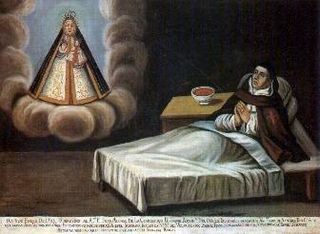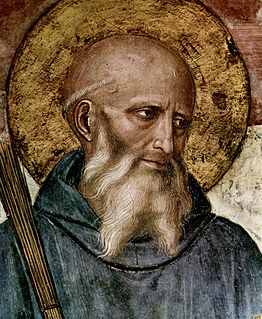Related Research Articles

Anglicanism is a Western Christian tradition that has developed from the practices, liturgy, and identity of the Church of England following the English Reformation.

A nun is a member of a religious community of women, typically living under vows of poverty, chastity, and obedience in the enclosure of a monastery. Communities of nuns exist in numerous religious traditions, including Buddhism, Christianity, Jainism, and Taoism.

The Society of St Vincent de Paul is an international voluntary organization in the Catholic Church, founded in 1833 for the sanctification of its members by personal service of the poor.

The Nippon Sei Ko Kai, abbreviated as NSKK, or sometimes referred to in English as the Anglican Episcopal Church in Japan, is the national Christian church representing the Province of Japan within the Anglican Communion.

The Anglican Use is an officially approved form of liturgy used by former members of the Anglican Communion who joined the Catholic Church while wishing to maintain "aspects of the Anglican patrimony that are of particular value".

Christian monasticism is the devotional practice of individuals who live ascetic and typically cloistered lives that are dedicated to Christian worship. It began to develop early in the history of the Christian Church, modeled upon scriptural examples and ideals, including those in the Old Testament, but not mandated as an institution in the scriptures. It has come to be regulated by religious rules and, in modern times, the Canon law of the respective Christian denominations that have forms of monastic living. Those living the monastic life are known by the generic terms monks (men) and nuns (women). The word monk originated from the Greek μοναχός, itself from μόνος meaning 'alone'.
The Society of the Atonement, also known as the Friars and Sisters of the Atonement or Graymoor Friars and Sisters is a Franciscan religious congregation in the Latin Rite branch of the Catholic Church. The friars and sisters were founded in 1898 as a religious community in the Episcopal Church. The religious order is dedicated to the Blessed Virgin Mary under the Marian title of Our Lady of Atonement.

The term "Third Order" signifies, in general, lay members of religious orders, who do not necessarily live in community and yet can claim to wear the habit and participate in the good works of some great order. Roman Catholicism, Anglicanism, and Lutheranism all recognize Third Orders. They were a twelfth-century adaptation of the medieval monastic confraternities.

Anglican religious orders are communities of men or women in the Anglican Communion who live under a common rule of life. The members of religious orders take vows which often include the traditional monastic vows of poverty, chastity and obedience, or the ancient vow of stability, or sometimes a modern interpretation of some or all of these vows. Members may be laity or clergy, but most commonly include a mixture of both. They lead a common life of work and prayer, sometimes on a single site, sometimes spread over multiple locations.

There are a number of Benedictine Anglican religious orders, some of them using the name Order of St. Benedict (OSB). Just like their Roman Catholic counterparts, each abbey / priory / convent is independent of each other. The vows are not made to an order, but to a local incarnation of the order, hence each individual order is free to develop its own character and charism, yet each under a common rule of life after the precepts of St. Benedict. Most of the communities include a confraternity of oblates. The order consists of a number of independent communities:
The Third Order of Saint Francis, is a third order in the Franciscan order. The preaching of Francis of Assisi, as well as his example, exercised such an attraction on people that many married men and women wanted to join the First Order (friars) or the Second Order (nuns), but this being incompatible with their state of life, Francis found a middle way and in 1221 gave them a rule according to the Franciscan charism. Those following this rule became members of the Franciscan Third Order, sometimes called tertiaries. It includes religious congregations of men and women, known as Third Order Regulars; and fraternities of men and women, Third Order Seculars. The latter do not wear a religious habit, take vows, or live in community. However, they do gather together in community on a regular basis. "They make profession to live out the Gospel life and commit themselves to that living out the Gospel according to the example of Francis."
The Society of St John the Evangelist (SSJE) is an Anglican religious order for men. The members live under a rule of life and, at profession, make monastic vows of poverty, celibacy and obedience.
United Society Partners in the Gospel (USPG) is a United Kingdom-based charitable organization.
The Anglican Order of Preachers is an Anglican religious order sometimes referred to as the "Dominicans".

Franciscan spirituality in Protestantism refers to spirituality in Protestantism inspired by the Catholic friar Saint Francis of Assisi. Emerging since the 19th century, there are several Protestant adherent and groups, sometimes organised as religious orders, which strive to adhere to the teachings and spiritual disciplines of Saint Francis of Assisi.
A personal ordinariate, sometimes called a "personal ordinariate for former Anglicans" or more informally an "Anglican ordinariate", is a canonical structure within the Catholic Church established in accordance with the apostolic constitution Anglicanorum coetibus of 4 November 2009 and its complementary norms. The ordinariates were established in order to enable "groups of Anglicans" to join the Catholic Church while preserving elements of their liturgical and spiritual patrimony. They are juridically equivalent to a diocese, "a particular church in which and from which exists the one and unique Catholic Church", but may be erected in the same territory as other dioceses "by reason of the rite of the faithful or some similar reason".

The Personal Ordinariate of the Chair of Saint Peter is a personal ordinariate of the Roman Catholic Church—a jurisdiction within the Church, the equivalent of a diocese, for priests and laypeople from an Anglican background, that enables them to retain elements of their Anglican patrimony after entering the Catholic Church. Its territory extends over the United States and Canada. Former Methodists and former members of communions of "Anglican heritage" such as the United Church of Canada are also included.

Former religious orders in the churches of the Anglican Communion are those communities of monks, nuns, friars, or sisters, having a common life and rule under vows, whose work has ended and whose community has been disbanded. In a very few cases this is due to the termination of the work for which the community was established, but in most cases it is due to amalgamation or the death of the final remaining member of the community.

St Mark's Anglican Church is a heritage-listed church at 36 Larnach Street, Allenstown, Rockhampton, Rockhampton Region, Queensland, Australia. It was built in 1900. It was added to the Queensland Heritage Register on 28 July 2000.
References
- The Anglican Religious Communities Yearbook, 2004–2005.
| This Anglicanism-related article is a stub. You can help Wikipedia by expanding it. |
.
